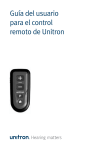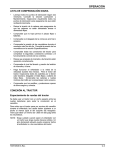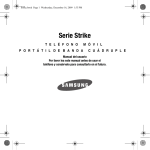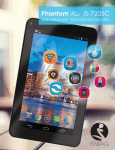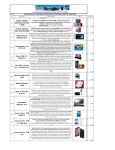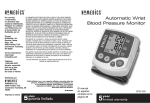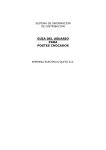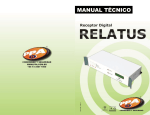Transcript
SHARK User Manual | Manual de Usuario Welcome Thank you for purchasing this innovative iSWAG product. Due to different software versions and network operators, refer to your phone for the correct details. The specifications in this manual are subject to change without notice. iSWAG reserves the final right to interpret the performance of this mobile phone. While the utmost care was taken in the production of this manual, neither iSWAG nor any other affiliated company, assumes responsibility for any mistakes or errors that may be contained in this document. iSWAG and the iSWAG logo are registered trademarks of iSWAG. Other trademarks are the property of their respective owners. Description of Keys [Left soft key] Press this key to enter the main menu Press this key to confirm the function Press this key to answer a call [Right soft key] Press this key to enter phonebook Press this key to go back to previous menu Press this key to reject a call [OK Key] Press OK key to confirm and enter main menu, press and hold this key to turn on torch light [Call key] Press this key to make a call Press to answer an incoming call Press to enter call history [End key] Press to end a call, press and hold to turn off phone Power On: Press and hold to turn on phone Press this key to go back to standby screen. [Navigation keys] Press to scroll through options when browsing a function list. In edit mode, press direction keys to navigate. In standby mode, press a direction key to enter the specified function page. You can also customize direction keys to match the desired functions. In conversation mode, press up or down to adjust volume [Number keys] Dial numbers to make call. Press and hold number keys for speed dial, if you set speed dial on. [ * key] , press * key twice. In Player function or FM radio press * key to decrease volume. [ # key] Press and hold this key to switch between profiles. Press with left soft key to lock the keypad. In Player function or FM radio, press # key to increase volume. Bienvenido Gracias por haber adquirido este teléfono móvil innovador iSWAG. Lo invitamos a leer las instrucciones presentes en este manual para que pueda configurar y utilizar todas las funciones que ofrece su teléfono nuevo. Las especificaciones en este manual están sujetas a cambios sin aviso. iSWAG reserva el derecho de interpretar el funcionamiento y rendimiento de este teléfono móvil. Aunque este manual fue elaborado a conciencia y con mucho cuidado, iSWAG ni ninguna empresa afiliada, asume responsabilidad por cualquier error o errores contenidos en este documento. iSWAG y el logotipo de iSWAG son marcas registradas de iSWAG. El resto de las marcas comerciales son la propiedad de sus respectivos dueños. Funciones de las Teclas [Tecla de Función Izquierda] Oprima esta tecla para ingresar al menú principal Oprima esta tecla para confirmar una función Oprima esta tecla para contestar una llamada [Tecla de Función Derecha] Oprima esta tecla para abrir los contactos Oprima esta tecla para regresar a la pantalla Oprima esta tecla para rechazar una llamada [Tecla de OK] Oprima esta tecla para confirmar una función y para ingresar al menú principal. Oprima y aguante esta tecla para utilizar la linterna. [Tecla de Llamadas] Oprima esta tecla para iniciar una llamada Oprima esta tecla para contestar una llamada Oprima esta tecla para revisar el registro de llamadas. [Tecla de Finalizar] Oprima esta tecla para terminar una llamada. Oprima y aguante esta tecla para apagar el teléfono. Para encender el teléfono oprima y aguante esta tecla Oprima esta tecla para regresar a la pantalla inicial. [Teclas de Navegación] Oprima esta tecla para mostrar las opciones y funciones disponibles. En ciertas pantallas, esta tecla se puede utilizar para navegar. En modo de espera puede utilizar estas teclas para abrir ciertas pantallas. Estas teclas se pueden programar. Durante una conversación, puede oprimir la tecla hacia arriba o hacia abajo para ajustar el volumen. [Teclas Numéricas] Oprima las teclas numéricas, del 0 al 9, para ingresar números y caracteres. Oprima y aguante las teclas numéricas para efectuar marcación rápida. La tecla # y la tecla * corresponden a diferentes funciones dependiendo de la pantalla o el menú. En función de reproductor de audio o radio FM la tecla * baja el volumen y la tecla # aumenta el volumen. La tecla # también la puede utilizar para cambiar de perfil. Para Comenzar 1. Instalar la Tarjeta SIM y la Batería Inserte con cuidado la tarjeta SIM, con los conectores dorados hacia abajo, en la ranura. Alinee la tarjeta con la muesca de la ranura. Nota: Para no dañar la tarjeta SIM asegúrese de apagar el teléfono antes de instalar o retirar la tarjeta 2. Retirar la Batería y la Tarjeta SIM Antes de retirar la batería y la tarjeta SIM asegúrese de que el teléfono este apagado. 3. Como Cargar la Batería Toma aproximadamente dos horas y media para cargar la bacteria. La carga restante de la batería se muestra en pantalla por medio del icono que aparece a la derecha de la pantalla en la esquina superior. Cuando se está cargando la batería, una animación aparece en pantalla. Cuando la batería ha terminado de cargar, la animación desaparece. Mientras que es carga la batería es normal que el teléfono, la batería y el cargador se calienten. Nota: La batería se tiene que cargar en un lugar con propia ventilación y con una temperatura entre -10 ~+55 . Si la temperatura está muy alta o muy baja, el teléfono le mostrara un aviso. Solo se pueden utilizar baterías, cargadores y accesorios aprobados por el fabricante. ¡El uso de una batería, cargador o accesorios no aprobados podría dañar el teléfono móvil y causar daño! 4. Encender y Apagar el Teléfono Para encender o apagar su teléfono, mantenga oprimida la tecla de Finalizar hasta que encienda la pantalla y aparecerá la animación de inicio o se apague la pantalla. Si intenta encender el teléfono sin una tarjeta SIM instalada, el teléfono mostrara el mensaje “Instale la tarjeta SIM”. Al encender el teléfono pudiera ver uno de estos mensajes: Ingrese su clave – si ha programado una clave la tiene que ingresar aquí Ingrese el Código – tiene que ingresar el código de la tarjeta SIM Buscando – el teléfono está buscando automáticamente la red local Getting Started 1. Installing the SIM Card and the Battery Ensure that the gold contact area on the SIM card is facing downward, and the beveled edge is properly aligned with the SIM card slot. Warning: Make sure to switch off the phone before taking out SIM card, otherwise your SIM card might be damaged. 2. Removing the Battery and the SIM Card. Before removing the battery and the SIM card, ensure that your phone is powered off. 3. Charging Batter. It takes about 2.5 hours to fully charge the battery. While charging, the power indicator on the phone’s display will flash and rotate, if the phone is off a charging screen will appear indicating the phone is charging. Once the charging indicator stops flashing, charging has completed, if the phone is off a charging-finished icon will appear. It is normal for the battery, phone, and charger to get hot during the charging process. Note: Battery must be charged in a well-ventilated area with a temperature between -10℃~+55℃. Only use a charger provided by manufacturer. Using an unauthorized charger might cause damage and voids the warranty. If the charging temperature is too high or too low, the phone will automatically give a warning and stop charging to prevent damage. 4. Turn phone on/off To turn phone on/off, press and hold the End key. If you turned on the phone without a SIM card installed you will see the prompt "Insert SIM card". Once the phone is ready you may see the following prompts: Enter phone password – if you have set up phone lock password. Enter PIN – if you have set up SIM card password. Search – the phone will search till finding appropriate network connection. Basic Functions 1 Making a call When the logo of the service provider appears on the display screen, you can dial or receive calls. The info bar at the upper left corner of the display screen shows network signal strength (when there are 5 info bars the signal is at its strongest). The call quality is very likely to be affected by obstructions; therefore movement in a small area can effectively improve call performance. Enter phone number, then press Dial Key to make the call. 2 Llamada de Emergencia Aunque no tenga una tarjeta SIM instalada, puede realizar llamadas de emergencia con el teléfono. En la pantalla vera un mensaje “Llamada de emergencia” para indicar que solo puede realizar ese tipo de llamadas. 3 Como contestar una llamada Oprima la tecla de marcación para contestar una llamada. Si tiene un audífono de manos libres puede contestar una llamada por medio del botón del audífono. También, con el audífono manos libres conectado, puede activar la función de contestación automática para contestar la llamada en cuanto entra. Si tiene activada la función de contestar con cualquier tecla puede oprimir cualquier tecla, menos [Tecla de Finalizar] y [Teclas de Navegación] para contestar una llamada. 4 Registro de Llamadas El teléfono mantiene un registro de llamadas que incluye la última llamada perdida, llamadas recibidas, llamadas realizadas, tiempo de la última llamada, tiempo total en uso. 5 Opciones durante una Llamada Durante una llamada aparecerá el mensaje “Opciones” en pantalla que le mostrara las opciones disponibles*. Función de altavoz Poner llamada actual en espera Abrir pantalla de contactos Abrir registro de llamadas Abrir menú de mensajes Grabar llamada actual Silenciar llamada Llamada multipartita Llamada en espera * Algunas funciones dependen de su red o proveedor local. Menú de Funciones 1 Como Seleccionar Opciones Desde la pantalla en espera puede oprimir la tecla de función izquierda para abrir el menú de funciones o si está en una llamada puede seleccionar “Opciones” para abrir el menú de opciones durante una llamada. Utilice la tecla de navegación para seleccionar la opción deseada. Para salir del menú oprima la tecla de función derecha o la tecla de finalizar para regresar a la pantalla en espera. 2 Emergency calls As long as in the network service range (which can be confirmed by checking the signal strength bars), you can always call emergency service. If your network supplier does not provide roaming service in your area, the screen will display"Emergency", to inform you that only emergency calls are permitted. If you are within the network service range, you can also make emergency calls even without the SIM card. 3 Answering a call Simply press the Call Key to answer an incoming call. If an earphone has been connected, use the button on the earphone to answer a call. If it is not convenient for you to press it, turn on automatic answer, assuring that the earphone is plugged in, so as to answer calls automatically while the phone rings or vibrates. If Any Key answer function is chosen, pressing any key, other than End key and up/down key, can answer an incoming call. 4 Call records Your phone can also store call records of the latest missed calls, received calls, dialed calls, time of last call as well as total talk time. 5 Call options When on a call pressing “Options” will display the options available during a call*: Turn on Speaker phone, Put current call on hold, Enter contacts menu, Enter Call log menu, Enter message menu, Record the current call, Mute, Multiple party conference call, Call Waiting * Some of these functions are dependent on the services offered by your operator. Function menu 1 Scrolling and selecting functions In standby mode press left soft key "menu" to enter function menu, or during a call, press ”Options” to enter call option menu. Press up or down keys to scroll to the function you need, then press left soft key, or OK key, to enter that function. You can exit a menu by pressing the right soft key, or the End key to return to standby mode. 2 Lista de Funciones 1 Registros de llamadas 2 Contactos 3 STK(Herramientas para SIM) 4 Multimedia 4-1 Cámara 4-2 DV 4-3 Audio 4-4 Video 4-5 Radio FM 4-6 Grabadora 4-7 Imágenes 4-8 Snake (juego) 5 Mensajes 5-1 Escribir mensaje 5-2 Bandeja de entrada 5-3 Bandeja de salida 5-4 Borrador 5-5 Correos enviados 5-6 Bandeja de entrada con seguridad 5-7 Plantilla 5-8 Difundir mensaje 5-9 Correo de voz 6 Perfiles 6-1 Normal 6-2 Silencio 6-3 Interior 6-4 Exterior 7 Herramientas 7-1 Whatsapp 7-2 Mis archivos 7-3 Alarma 7-4 Calendario 7-5 Bluetooth 7-6 Calculadora 7-7 Reloj Mundial 7-8 Ebook 7-9 Linterna 8 Internet 9 Ajustes 9-1 Ajustes de llamadas 9-2 Ajustes del teléfono 9-3 Pantalla 9-4 Seguridad 9-5 Conexiones Declaración de la FCC Requisitos de la Comisión Federal de Comunicaciones (FCC), parte 15 Este equipo ha sido probado y cumple con los límites de un dispositivo digital clase B, de conformidad con la parte 15 del reglamento de la FCC. Dichos límites fueron diseñados para brindar una protección suficiente contra la interferencia nociva en residencias. Este equipo genera, utiliza y puede emitir energía de radiofrecuencia y, si no se instala y se utiliza de conformidad con las instrucciones, puede generar interferencia nociva a las comunicaciones de radio. Sin embargo, no hay garantía de que no se presente interferencia en un lugar particular. Si este equipo genera interferencia nociva con la recepción de radio o televisión, lo que puede determinarse apagando y encendiendo el equipo, el usuario puede corregir la interferencia de una de las siguientes maneras: 2 List of functions 1 Call logs 2 Contacts 3 STK(SIM Toolkit) 4 Multimedia 4-1 Camera 4-2 DV 4-3 Audio 4-4 Video 4-5 FM radio 4-6 Recorder 4-7 Image 4-8 Snake 5 Message 5-1 Write message 5-2 Inbox 5-3 Outbox 5-4 Drafts 5-5 Send box 5-6 Security inbox 5-7 Templates 5-8 Broadcast message 5-9 Voice mail server 6 Profiles 6-1 Normal 6-2 Silent 6-3 Indoor 6-4 Outdoor 7 Tools 7-1 Whatsapp 7-2 My files 7-3 Alarm 7-4 Calendar 7-5 Bluetooth 7-6 Calculator 7-7 World clock 7-8 Ebook 7-9 Torch 8 Internet 9 Settings 9-1 Call settings 9-2 Phone settings 9-3 Display 9-4 Security 9-5 Connections FCC Statement This equipment has been tested and found to comply with the limits for a Class B digital device, pursuant to part 15 of FCC Rules. These limits are designed to provide reasonable protection against harmful interference in a residential installation. This equipment generates and can radiate radio frequency energy and, if not installed and used in accordance with the instructions, may cause harmful interference to radio communications. However, there is no guarantee that interference will not occur in a particular installation. If this equipment does cause harmful interference to radio or television reception, which can be determined by turning the equipment off and on, the user is encouraged to try to correct the interference by one or more of the following measures: • Reorient or relocate the receiving antenna. • Increase the separation between the equipment and receiver. • Connect the equipment into an outlet on a circuit different from that to which the receiver is connected. • Consult the dealer or an experienced radio/TV technician for help. This device complies with Part 15 of FCC Rules. Operation is subject to the following two conditions: (1) This device may not cause harmful interference, and (2) This device must accept any interference received, including interference that may cause undesired operation. Note: The manufacturer is not responsible for any radio or TV interference caused by unauthorized modifications to this equipment. such modifications could void the user’s authority to operate this equipment. Any Changes or modifications not expressly approved by the party responsible for compliance could void the user's authority to operate the equipment. Declaración de SAR Este teléfono móvil ha sido diseñado según los requisitos de seguridad aplicables para la exposición a ondas de radio. Su teléfono inalámbrico es un transmisor y receptor de radio. Está diseñado para no superar los límites* de exposición a energía de radiofrecuencia (RF) fijados por las autoridades gubernamentales. Estos límites establecen los niveles permitidos de energía de RF para la población general. Las especificaciones se basan en los estándares desarrollados por organizaciones científicas internacionales mediante evaluaciones periódicas y minuciosas de estudios científicos. Los estándares incluyen un margen de seguridad destinado a garantizar la seguridad de todas las personas, independientemente de la edad y de la salud. Según se reportó a las autoridades, el valor más alto de SAR de este modelo de teléfono cuando se probó es de un promedio de 1.6 W/kg* por un gramo de tejido. Puede obtener información más detallada en http://www.fcc.gov/oet/ea/fccid/. Utilice número de identificación de la FCC del dispositivo para obtener mayor información. Este dispositivo fue probado para operaciones típicas cerca del cuerpo manteniendo la parte posterior del teléfono a una distancia de 0mm del cuerpo. Para cumplir con estos requisitos de exposición RF de la FCC, los accesorios deben de mantener una distancia de 1.5cm de los órganos del usuario. El uso de clips de cinturón, fundas y similares accesorios no deben contener componentes metálicos en su montaje. El uso de accesorios que no cumplan con estos requisitos pueden no cumplir con los requisitos de exposición RF de la FCC, y debe ser evitado. FCC ID: Especificaciones iSWAG Shark • Reorientar o reubicar la antena receptora. • Aumentar la separación entre el equipo y el receptor. • Conectar el equipo en una toma que esté en un circuito distinto del circuito en el que está conectado el receptor. • Consultar al distribuidor o a un técnico de radio y televisión con experiencia. PRECAUCIÓN: Los cambios o modificaciones que no estén aprobados expresamente por el fabricante de este dispositivo podrían invalidar la autoridad del usuario para operar el equipo. Este dispositivo cumple con la parte 15 del reglamento de la FCC. Su operación está sujeta a las siguientes dos condiciones: (1) no es probable que este dispositivo genere interferencia nociva, y (2) este dispositivo debe aceptar cualquieri nterferencia. Las especificaciones están sujetas a cambios. * La capacidad real puede ser menor debido al software del teléfono. ** Ciertos formatos de archivos pueden ser incompatibles. SAR Statement This Phone meets the government's requirements for exposure to radio waves. The guidelines are based on standards that were developed by independent scientific organizations through periodic and thorough evaluation of scientific studies. The standards include a substantial safety margin designed to assure the safety of all persons regardless of age or health. FCC RF Exposure Information and Statement The SAR limit of USA (FCC) is 1.6W/kg averaged over one gram of tissue. This device has also been tested against this SAR limit. Detail SAR information of this device can be viewed on-line at http://www.fcc.gov/oet/ea/fccid/. Please use the device FCC ID number for search. This device was tested for typical body-worn operations with the back of the handset kept 0mm from the body. To maintain compliance with FCC RF exposure requirements, use accessories that maintain a 1.5cm separation distance between the user's bodies. The use of belt clips, holsters and similar accessories should not contain metallic components in its assembly. The use of accessories that do not satisfy these requirements may not comply with FCC RF exposure requirements, and should be avoided. FCC ID: Specifications iSWAG Shark Specifications are subject to change without prior notice. * Actual storage may be less due to device software. ** Certain bitrates, resolutions, and/or file variations may not be compatible.

